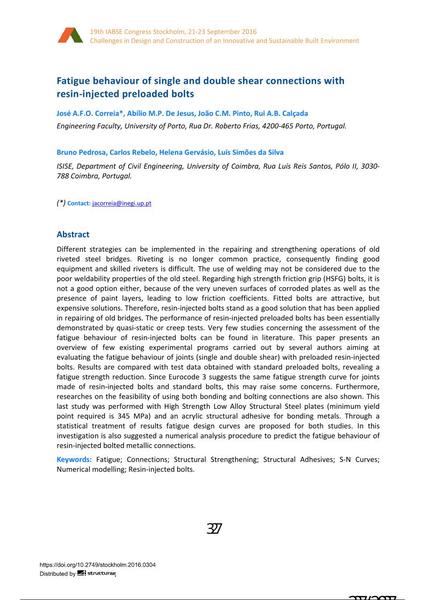Fatigue behaviour of single and double shear connections with resin-injected preloaded bolts

|
|
|||||||||||
Détails bibliographiques
| Auteur(s): |
José A. F. O. Correia
(Engineering Faculty, University of Porto, Rua Dr. Roberto Frias, 4200-465 Porto, Portugal.)
Abilio M. P. de Jesus (Engineering Faculty, University of Porto, Rua Dr. Roberto Frias, 4200-465 Porto, Portugal.) João C. M. Pinto (Engineering Faculty, University of Porto, Rua Dr. Roberto Frias, 4200-465 Porto, Portugal.) Rui A. B. Calçada (Engineering Faculty, University of Porto, Rua Dr. Roberto Frias, 4200-465 Porto, Portugal.) Bruno Pedrosa (ISISE, Department of Civil Engineering, University of Coimbra, Rua Luís Reis Santos, Pólo II, 3030- 788 Coimbra, Portugal.) Carlos Rebelo (ISISE, Department of Civil Engineering, University of Coimbra, Rua Luís Reis Santos, Pólo II, 3030- 788 Coimbra, Portugal.) Helena Gervásio (ISISE, Department of Civil Engineering, University of Coimbra, Rua Luís Reis Santos, Pólo II, 3030- 788 Coimbra, Portugal.) Luis Simões da Silva (ISISE, Department of Civil Engineering, University of Coimbra, Rua Luís Reis Santos, Pólo II, 3030- 788 Coimbra, Portugal.) |
||||
|---|---|---|---|---|---|
| Médium: | papier de conférence | ||||
| Langue(s): | anglais | ||||
| Conférence: | IABSE Congress: Challenges in Design and Construction of an Innovative and Sustainable Built Environment, Stockholm, Sweden, 21-23 September 2016 | ||||
| Publié dans: | IABSE Congress Stockholm, 2016 | ||||
|
|||||
| Page(s): | 327-339 | ||||
| Nombre total de pages (du PDF): | 13 | ||||
| Année: | 2016 | ||||
| DOI: | 10.2749/stockholm.2016.0304 | ||||
| Abstrait: |
Different strategies can be implemented in the repairing and strengthening operations of old riveted steel bridges. Riveting is no longer common practice, consequently finding good equipment and skilled riveters is difficult. The use of welding may not be considered due to the poor weldability properties of the old steel. Regarding high strength friction grip (HSFG) bolts, it is not a good option either, because of the very uneven surfaces of corroded plates as well as the presence of paint layers, leading to low friction coefficients. Fitted bolts are attractive, but expensive solutions. Therefore, resin-injected bolts stand as a good solution that has been applied in repairing of old bridges. The performance of resin-injected preloaded bolts has been essentially demonstrated by quasi-static or creep tests. Very few studies concerning the assessment of the fatigue behaviour of resin-injected bolts can be found in literature. This paper presents an overview of few existing experimental programs carried out by several authors aiming at evaluating the fatigue behaviour of joints (single and double shear) with preloaded resin-injected bolts. Results are compared with test data obtained with standard preloaded bolts, revealing a fatigue strength reduction. Since Eurocode 3 suggests the same fatigue strength curve for joints made of resin-injected bolts and standard bolts, this may raise some concerns. Furthermore, researches on the feasibility of using both bonding and bolting connections are also shown. This last study was performed with High Strength Low Alloy Structural Steel plates (minimum yield point required is 345 MPa) and an acrylic structural adhesive for bonding metals. Through a statistical treatment of results fatigue design curves are proposed for both studies. In this investigation is also suggested a numerical analysis procedure to predict the fatigue behaviour of resin-injected bolted metallic connections. |
||||
